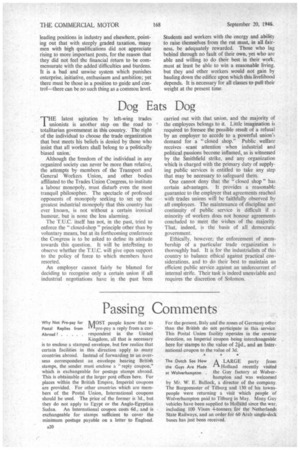Dog Eats Dog
Page 22

If you've noticed an error in this article please click here to report it so we can fix it.
latest agitation by left-wing trades runionists is another step on the road to totalitarian government in this country. The right of the individual to choose the trade organization that best meets his beliefs is denied by those who insist that all workers shall belong to a politically biased union.
Although the freedom of the individual in any organized society can never be more than relative, the attempts by members of the Transport and General Workers Union, and other bodies affiliated to the Trades Union Congress, to institute a labour monopoly, must disturb even the most tranquil philosopher. The spectacle of professed opponents of monopoly seeking to set up the greatest industrial monopoly that this country has ever known, is not without a certain ironical humour, but is none the less alarming.
The T.U.C. itself has not, in the past, tried to enforce the " closed-shop " principle other than by voluntary means, but at its forthcoming conference the Congress is to be asked to define its attitude towards this question. It will be intePtsting to observe whether the T.U.C. will give open support to the policy of force to which members have resorted.
An employer cannot fairly be blamed for deciding to recognise only a certain union if all industrial negotiations have in the past been carried out with that union, and the majority of the employees belongs to it. Little imagination is required to foresee the possible result of a refusal by an employer to accede to a powerful union's demand for a "closed shop." Public welfare receives scant attention when industrial and political passions become inflamed, as is witnessed by the Smithfield strike, and any organization which is charged with the primary duty of supplying public services is entitled to take any step that may be necessary to safeguard them.
One cannot deny that the "closed shop" has certain advantages. It provides a reasonable guarantee to the employer that agreements reached with trades unions will be faithfully observed by all employees. The maintenance of discipline and continuity of public service is difficult if a minority of workers does not honour agreements concluded to meet the wishes of the majority. That, indeed, is the basis of all democratic government.
Ethically, however, the enforcement of membership of a particular trade organization is thoroughly bad. It is for the industrialists of this country to balance ethical against practical considerations, and to do their best to maintain an efficient public service _against an undercurrent of internal strife. Their task is indeed unenviable and requires the discretion of Solomon.




































































